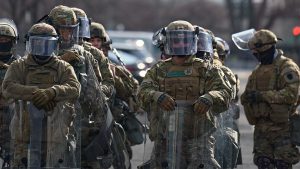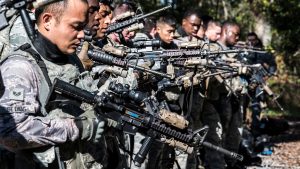The Problem of Militarization
 In a free and democratic society, the military protects the nation against foreign enemies and assists it domestically during emergencies. In an oligarchy or dictatorship, the military is transformed from an institution that serves its citizens into one that controls them.
In a free and democratic society, the military protects the nation against foreign enemies and assists it domestically during emergencies. In an oligarchy or dictatorship, the military is transformed from an institution that serves its citizens into one that controls them.
Indications of problematic militarization are:
- When an inordinate percent of a nation’s wealth is directed away from the citizenry and its social needs, and into a military/industrial clique that saps the wealth of the nation;
- When foreign wars and incursions serve the interests of corporate wealth, and not the national well-being;
- When participation in the military becomes an unwarranted burden, and youth are coerced, forced, and manipulated to serve in institutions that do not serve their interests;
- And, when the military itself carries such influence with political/corporate leaders that the very decision-making process of democracy is threatened.
When these four conditions become the norm, rather than the exception, the citizenry of a country become servants to its own government. The Military Law Task Force monitors these aspects of military life and involvement, creates programs to counter unnecessary militaristic involvement, and reports its finding to the National Lawyers Guild and the nation.
The Challenge to Maintain our Civil and Human Rights
 The armed forces in the United States, during this period of history, pose concerns for all people interested in civil and human rights. As an institution, the military is used to carry out an immoral, interventionist foreign policy.
The armed forces in the United States, during this period of history, pose concerns for all people interested in civil and human rights. As an institution, the military is used to carry out an immoral, interventionist foreign policy.
To maintain the availability of such a force, men and women in uniform are routinely deprived of civil liberties and subjected to bigotry, abuse and harassment. Veterans often have difficulty obtaining the benefits promised from the Veterans Administration, and many face a life-long stigma of less-than-honorable discharges.
Efforts to revive a draft to continue the supply of human resource for this system can be seen in a number of national service proposals. The lives and outlooks of people in every community in the nation are profoundly affected by their experiences in these institutions.
These problems have not gone unchallenged. People continue to organize against a possible draft and compulsory national service. GIs continue to protest military policy and their basic lack of freedom. Veterans have organized to protect eroding benefits and to protest interventionist policies. Community-based organizations are working now to challenge the influence of the military in schools and other community institutions. The National Lawyers Guild is committed to providing legal and political support to these efforts.


